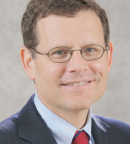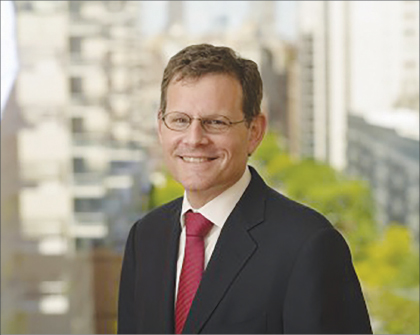
To me, heading ASCO is the best answer to the question, ‘What can I do next that will let me contribute in the deepest and broadest way to improving the care and outcomes of our patients?— Clifford A. Hudis, MD, FACP, FASCO
Tweet this quote
On June 27, 2016, Clifford A. Hudis, MD, FACP, FASCO, will begin his tenure as Chief Executive Officer of ASCO, succeeding Allen S. Lichter, MD, FASCO, who presided over the Society and the Conquer Cancer Foundation of ASCO since 2006. Dr. Hudis’ dedication to ASCO dates back more than 25 years as a member and volunteer. He served as President of ASCO from 2013 to 2014 and has held several other prominent positions, including member of ASCO’s Board of Directors from 2009 to 2015, Board Treasurer from 2009 to 2012, and member of the Executive and Planning Committees from 2009 to 2013. Dr. Hudis was Co-Chair of the Board’s Finance and Governance Subcommittee and Chair of the Finance Committee from 2009 to 2012, and was most recently Chair-Elect of ASCO’s Government Relations Committee. He has also served on the CancerLinQ™ Board of Governors since 2014 and will automatically become Chair of that body once he assumes the position of CEO later this month.
Dr. Hudis, a leading specialist in breast cancer treatment and a recognized expert in cancer prevention, has resigned from his positions as Chief of the Breast Medicine Service, Vice President for Government Relations, and Chief Advocacy Officer at Memorial Sloan Kettering Cancer Center and Professor of Medicine at Weill Cornell Medical College in New York. However, he will maintain a limited clinical practice in breast medicine at Memorial Sloan Kettering.
The ASCO Post talked with Dr. Hudis about his immediate and long-term goals for the Society.
Challenges and Opportunities
In the 10 years of Dr. Lichter’s tenure as CEO, ASCO experienced tremendous growth and developed numerous major initiatives. Although there is great progress being made in cancer care, unsustainable costs and a volatile oncology workforce environment are putting that care at risk. From your perspective, what are the greatest challenges facing ASCO and its members?
Dr. Lichter’s accomplishments over the past decade have been remarkable. He was not just a terrific CEO of ASCO, but he has been a fantastic mentor to a number of volunteers and staff as well.
I do think we face phenomenal opportunities. The global burden of cancer is better understood than ever before. There will always be social and political problems around the world, but there is also growing global affluence, and the proportion of people with middle-class aspirations and financial means, therefore, has never been greater. This suggests that there will be a growing need to provide cancer care throughout the world at levels similar to what is delivered in high-income countries.
While there are certainly potential threats to that care—and I’m not minimizing them—I look at our challenges right now with optimism. The need for the services our members deliver to patients has never been higher, and the chance to actually help people acquire the best outcomes has also never been greater.
A second opportunity is the rapid expansion of molecular biology, which has led to exciting new therapeutic options and better patient outcomes than ever before for some subsets of patients.
Considering these two areas of attention, I see tremendous opportunities for ASCO to continually improve and extend the reach of the highest-quality medical care possible on a global scale.
Goals and Priorities
What are your immediate priorities and goals for the Society, and what are your long-term goals?
My immediate goals are to continue to extend ASCO’s influence in the delivery of ever-improving patient care. Everything flows from that goal. To improve patient care, we have to continually improve how we educate providers (as well as patients) about the advances being made in molecular biology and how those advances are translating into more effective clinical care.
We also have to work hard to advocate for an environment that makes it possible for people to get the best cancer care not just in the United States, but around the world as well. We have to advocate for resources to make oncology an attractive specialty that brings in practitioners with new and creative ideas and the drive to make cancer care better. For me, these ideas are not a fundamental change in direction or focus for ASCO but a continued sharpening of our focus.
The primary mission of ASCO is to help clinicians provide high-quality patient care based on the best science and research. We are most successful when patients can seamlessly obtain optimal care for their cancer no matter where they live. So, I have a very clear long-term vision of a world where cancer care is continually being optimized, and ASCO is the means of making that vision a reality.
Eye-Opening Experience
You recently served as President of ASCO. How did that experience prepare you for your new position as CEO?
Being President of the Society helped me begin to imagine serving as CEO. It opened my eyes to the possibilities of what we could accomplish—to the opportunities to extend our reach, to improve the oncology workforce environment, and ultimately, to improve patient care. That is what is so exciting to me about this new opportunity.
CancerLinQ
CancerLinQ is in the final stages of development of its first version. When will this rapid-learning health-care system be available to all members?
Availability will begin this year. Progress is being made very rapidly, and there are now hundreds of thousands of individual patient records that have been integrated into the database. Dozens of centers representing both community practices and large cancer centers have already signed agreements and are contributing data on patients with a variety of cancers. In addition, a growing number of clinicians are asking to join CancerLinQ. I think we are going to see the first productivity from this effort shortly.
Value Framework
ASCO has developed the Value Framework to help oncologists assess the value of cancer treatment options with their patients. What has been the reaction from members so far, and when will the framework be completed and launched?

The conceptual framework was published last year.1 But I think we should consider the effort to be an ongoing work in progress as opposed to being a final product, because we are going to continually learn ways to reshape and refine it so that it better suits our members’ and patients’ needs, and adapts to multiple clinical scenarios and new clinical evidence. Addressing the issue of value in cancer care is inherently challenging, because it is something that has been historically seen as a subjective question. But we can’t dodge the issue of rising costs any longer by saying it is in the eye of the beholder, so even though it is really difficult, we are taking on the challenge.
An update to our value framework has just been published and ASCO will now move forward to using it as the basis of a software tool that doctors can use to inform shared decision-making with their patients about treatment options. . We received more than 400 comments on the earlier version of the framework—from physicians, patients, patient advocates, representatives from the pharmaceutical industry—and the majority of respondents supported the framework’s goals and overall approach. The extensive and thoughtful feedback helped us strengthen key elements of the framework to improve its utility. This needs to be a collaborative community effort to come to grips with a very challenging problem.
Health Policy Issues
In your various roles at Memorial Sloan Kettering, you worked with key stakeholders in health care to meet the changing forces and emerging needs in cancer care. As CEO of ASCO, will you take on a greater role in helping shape public health policy issues relating to cancer care and its costs?
This year, I was serving as the incoming Chair of ASCO’s Government Relations Committee, and these issues were central there, as they will continue to be when I become CEO. An important area where we can all make a difference is in providing accurate information and guidance to legislators and regulators, who basically want to do the right thing in these areas but often need to hear from well-informed organizations like ASCO to help them understand the issues better.
One of the more gratifying aspects of being involved in ASCO and now taking on this role as CEO is the chance to help inform the discussions around health-care policy issues. And I mean that in the broadest sense. Of course, we have to continue to educate the public about tobacco control and the connection between obesity and cancer risk, but we also have to educate the public and legislators about maintaining appropriate reimbursement for providers and the best approaches to controlling health-care costs while maintaining and enhancing the quality of the care we provide.
All of these areas have to be addressed, and I feel passionately that we as oncologists—and I mean cancer care providers in all specialties and disciplines—have to be fully engaged in the Society for ASCO to be successful in these areas. Otherwise, we will practice in an environment where we are simply the recipients of somebody else’s best ideas. We have to become an informed constituency and lead the discussion, not just follow it, so that we can favorably shape the health-care environment.
Becoming CEO of ASCO is a very, very exciting transition for me, and I am grateful to the Society—the staff, the volunteers, and the members—for giving me this opportunity. At the same time, I will always have a deep affection and respect for Memorial Sloan Kettering Cancer Center and its community.
To me, heading ASCO is the best answer to the question “What can I do next that will let me contribute in the deepest and broadest way to improving the care and outcomes of our patients?” ■
Disclosure: Dr. Hudis has served in a consulting or advisory role with Pfizer, Genentech, Novartis, Merck, and Eli Lilly; he also reported a relationship with the Breast Cancer Resarch Foundation.
Reference

